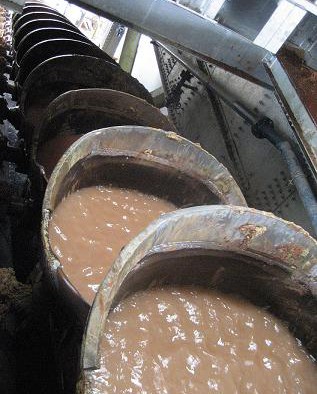There are 67 of those buckets on the new dredge, which, despite being massive and new, is still producing less than the old dredge. This is a problem, because the company, the Sierra Leonean government, the EU, and the company owner have each poured millions into making this mine profitable by increasing production with a fancy new dredge, thus far to no avail. All the same, as it stands, SRL accounts for 65% of Sierra Leone’s economy (I have no idea how this figure could possibly be true), which says a great deal more about the economy than the company.
Production is low, courtesy of power outages and glitches in tacking new technology onto really old equipment. Theft is widespread — about $1million a year in diesel fuel alone, which is to say nothing of the generators that get stolen every month or two, or the motors pulled out of vehicles. The company hemorrhages cash. As mine managers describe it, for the amount of money SRL spends replacing stolen stuff, they could actually do pretty impressive community service work (as it stands, their “community service foundation” has about $200,000 in it). Instead, they triple their security guards’ salaries (to very little effect, they say) hoping to stem the thefts.
EU assessors are here monitoring the state of their 25 million euro loan to the company — they’re supposed to be determining what social projects should be funded by loan repayments, but they told me they’re not totally confident the mine will be able to start making those payments by June when they start to come due.
So SRL builds schools (and begs the government to send teachers) and hospitals (and crosses their fingers that government will send supplies) and pays salaries to local officials to keep the power structure content with the company. Nary a community leader sings the company’s praises, though everyone is gladder than glad that it’s back in operation. It’s a complex situation. The rights of “life, liberty and the pursuit of happiness.” are definitively not interesting around here. I asked. People value their right to education, security (an odd one worth explaining more), water, electricity, and health care. Lacking these things, and lacking confidence in the government to provide them, they see it as the company’s responsibility to provide. The company, meanwhile, figures that since they’re paying local government, central government, and performing odd jobs around town (building roads, providing sand, leveling ground for new houses, etc), they’re doing all they can. Maybe they are. But maybe they don’t need a chartered jet flying down here three times a week. At this point I’m in no position to judge.


